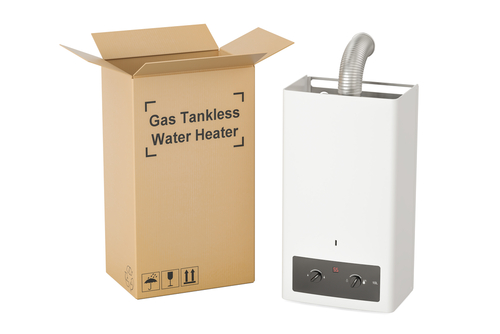Considering making the switch to a tankless water heater in your Washington D.C. rental property (properties)? The standard large water heater tanks are inefficient and becoming a thing of the past. Tankless water heaters are becoming increasingly popular and replacing tank heaters in many properties. However, just like with anything, the tankless water heater has pros and cons. Read on to help decide whether or not to get a tankless heater for your property.
What Is a Tankless Water Heater? 
A tankless water heater is precisely what it sounds like, a water heater that doesn’t require the standard large tank, which can be wasteful and highly inefficient. A tankless water heater, also known as an instant-on water hearer, instantly heats water as it flows. Unlike a traditional water heater, it doesn’t store high amounts of water. In fact, the only place a tankless heater stores water is in the coil. The mechanism is a minimal, space-saving product.
What Types of Tankless Water Heaters are There?
Once you decide to go the route of a tankless water heater, you must choose between a gas-powered heater or an electric heater. They are both more efficient than your standard tank but have some differences. The electric heater is by far the most energy-efficient option. Even the low-level models are 93% more efficient than the tank, according to the Department of Energy. The gas-powered heater is 23% more efficient (according to the Department of Energy), but offer a government rebate that you can’t get with the electric models. A gas-powered tankless water heater in your property qualifies you for a $300 federal tax rebate, as well as many state offered incentives.
Pros and Cons of a Tankless Water Heater
Pros:
- Energy-saving: We mentioned that low-end electric powered water heaters are 93% efficient. According to the Department of Energy, top models can be up to 98% more efficient. The gas models are 23% more efficient than the standard tank still. Regardless of the model chosen, you are saving energy and water, which is much better for the environment.
- Lower monthly costs: The energy cost month to month is more economical with a tankless heater. By the end of it, you will be saving hundreds annually.
- Longer lasting: The longest-lasting gas-powered tank models last at most twelve years. The tankless electric models can last up to 20 years, and some even surpass that. That is also saving money in the long run.
- Space saver: The size of these tankless heaters is small enough to be wall-mounted, saving a lot of space. The electric models tend to be about 10-inch x 7 inches and gas-powered models around 30 x 20 range, according to Home Guides.
- Endless hot water: Tank heaters will run out of hot water eventually compared to tankless systems, which provide a constant non-stop flow of hot water.
- Extended Warranties: The warranties for tankless models are longer than typical water heater warranties. Even if you don’t end up using it, having more extended protection is never a bad thing.
Cons:
- Higher initial costs: The cost to install the tankless water heaters is much more expensive than a standard tank. Plus, purchasing a property, it is likely to have a tank heater already. Installing a tankless one requires someone to remove the large, heavy tank and replace is with one of these models. The cost of the unit itself is also significantly more than a tank model. Therefore, upfront, your costs will be more.
- Rerouting gas lines: To install the gas-powered model, the gas lines in the property will need to be rerouted, which isn’t an easy (or cheap) task.
- Limited output: Just because there is a constant flow of water, doesn’t mean it is unlimited. It will reproduce more water, but if you use an excessive amount of water in one day, it will run out. Standard models heat a few gallons at a time, which is perfect for one shower and running the dishwasher. However, if dishes are running, sink water is running and multiple showers are in use, it will get cold much quicker than a tank would.
- Inconsistent temperatures: There is an inconsistency of temperatures with the tankless models. Usually, this issue occurs when multiple outlets of water are used at once, and the system is working at high capacity.
Is a Tankless Water Heater Right for Your Property?
Now that you’ve weighed the pros and cons of a tankless water heater, there are still a few things to consider:
- Always hire a licensed professional to install the system. As previously mentioned, these systems are complicated to put in. They are also expensive, so the last thing you want to do is mess up the installation.
- Weigh the pros and cons of electric and gas models and decide which options are for you. Keep in mind te objectivity, cost, efficiency, and install process, as mentioned in this previously mentioned in this post. Do more research if need be. Be sure the model you choose is the best for your property and budget!
- Read reviews on several different gas or electric options, depending on which you want to use. Each type of powered system comes with several models to choose from, and they are not all equal. Do your research!
Are you a landlord looking for more advice on upgrades for your Washington, D.C. rental property? Bay Property Management Group Washington D.C. offers full-service property management and experienced professionals to recommend upgrades that fit your needs.

